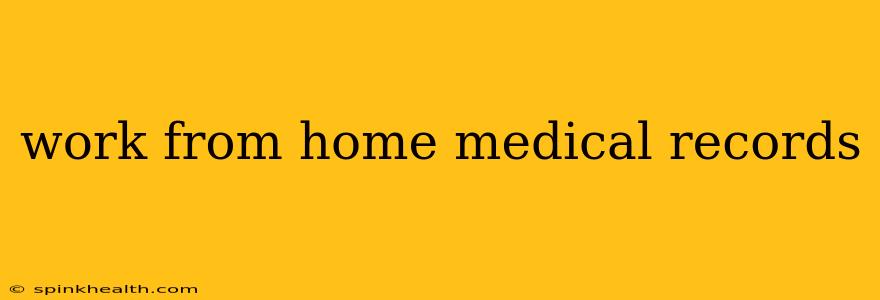The world of healthcare is transforming rapidly, and one of the most significant shifts is the rise of remote work, particularly in medical records management. The once-unthinkable idea of handling sensitive patient data from a home office is now a reality for many, driven by technological advancements and a changing work landscape. But what does this actually look like? And what are the considerations involved in this increasingly common practice? Let's delve into the world of work-from-home medical records.
What are the benefits of working from home as a medical records professional?
The benefits are numerous and appeal to many healthcare professionals. Imagine this: no more soul-crushing commutes, the flexibility to manage personal appointments without impacting work, and a more comfortable, personalized workspace. This translates to reduced stress, improved work-life balance, and potentially even increased productivity. The ability to work from home opens up opportunities for individuals with mobility challenges or those seeking a better balance between career and family responsibilities. It can also tap into a broader talent pool, attracting skilled professionals who might otherwise be geographically limited.
What are the challenges of working from home with medical records?
While the allure of working from home is undeniable, it's not without its hurdles. Maintaining data security is paramount. Protecting sensitive patient information from unauthorized access, whether through physical theft or cyberattacks, is a top priority. This necessitates robust security protocols, including strong passwords, encryption, and secure remote access technologies. Strict adherence to HIPAA regulations is non-negotiable.
Another challenge lies in maintaining effective communication and collaboration. Working remotely can sometimes lead to communication breakdowns, especially when dealing with complex medical cases or urgent requests. Effective communication strategies, including regular check-ins, clear protocols, and reliable communication tools, are crucial for seamless teamwork.
What are the necessary skills and qualifications for a work-from-home medical records position?
Employers are looking for individuals with more than just technical skills. A strong understanding of medical terminology, coding systems (like ICD-10 and CPT), and electronic health record (EHR) software is essential. But equally important are soft skills, including meticulous attention to detail, strong organizational abilities, and excellent problem-solving skills. The ability to work independently, manage time effectively, and maintain confidentiality under pressure is crucial for success in this role.
What technology is needed to work from home with medical records?
The technology requirements for this type of work are significant and constantly evolving. Reliable high-speed internet is a must, along with a secure and updated computer system. Specific software applications for managing medical records, often provided by the employer, are essential. Furthermore, secure remote access solutions must be in place to safeguard patient data and comply with regulations. Consideration must also be given to secure storage solutions for any physical medical records which may need to be temporarily stored at home. This requires careful planning and security measures to prevent unauthorized access.
How do I find work-from-home medical records jobs?
Finding work-from-home medical records jobs often involves leveraging online job boards, networking within healthcare professional groups, and directly contacting healthcare facilities. Many healthcare organizations are actively seeking remote workers and regularly post openings on their websites and job boards like Indeed, LinkedIn, and Monster. Tailoring your resume and cover letter to highlight your remote work experience and technical skills is vital in showcasing your suitability for these roles.
The transition to remote work in medical records is reshaping the healthcare industry, offering both significant benefits and unique challenges. By carefully addressing security concerns, maintaining clear communication, and developing robust technological infrastructure, the potential for efficient and secure remote work in this field is enormous. As technology continues to evolve, we can anticipate even more innovative solutions that will further enhance the opportunities for working from home in the medical records profession.

